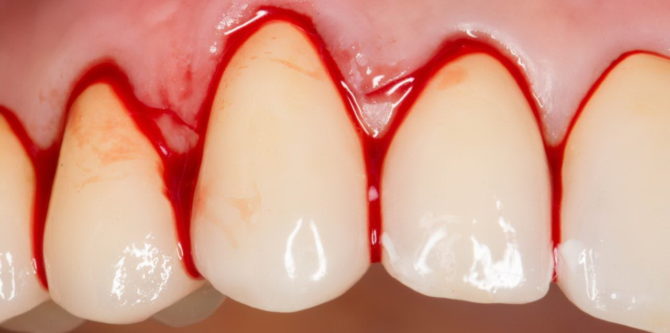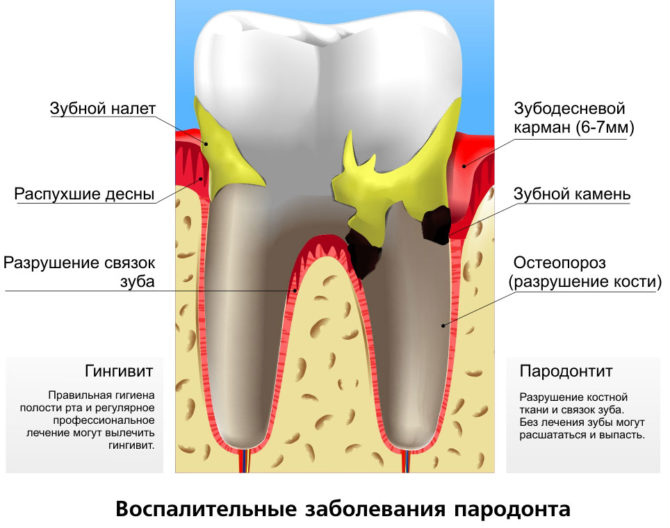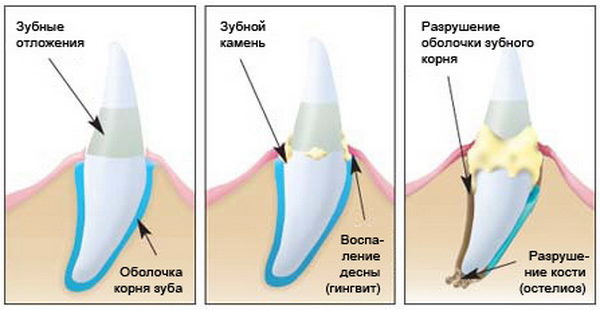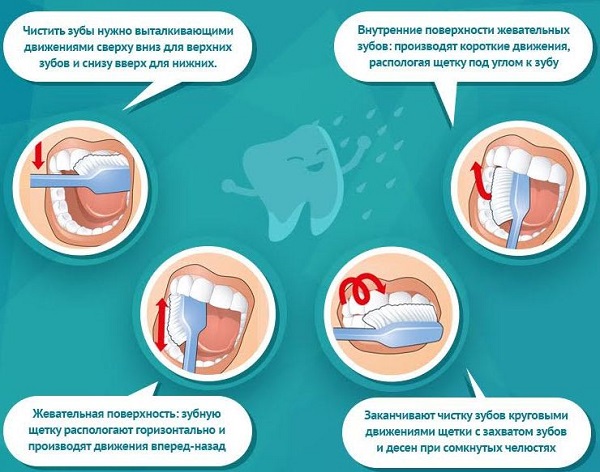Gum bleeding: causes, treatment and prevention
Even elementary bleeding of the gums requires professional treatment and a serious approach. Many patients with a similar problem prefer not to go to the dentist, because they see nothing wrong with it. But gum bleeding can lead to various dental diseases and even complete tooth loss.
Causes of Gum Bleeding
All causes of bleeding from the gums can be divided into:
- general diseases;
- injuries
- dental diseases.
Dental diseases
Most often, gingival bleeding is associated with dental pathologies., among them:
- tartar - hard deposits on enamel, which with a large accumulation irritate the mucous membrane of the gums;
- gingivitis - a typical inflammation of the gums and the most famous reason for their bleeding in minors;
- stomatitis - a disease accompanied by the formation of aphthae (sores) in the oral cavity;
- periodontitis - inflammation of the teeth, due to which the tooth begins to loosen and may fall out;
- periodontal disease - a deep lesion of periodontal disease.
General diseases
Bleeding from the gums often occur with serious chronic pathologies. Most often, they are caused by pathological blood coagulation. Similar diseases include thrombocytopenia and hemophilia. Also, the appearance of blood clots during brushing is one of the signs of an emerging tumor process: leukemia, leukemia and other types of cancer. This is due to the fact that many oncological pathologies lead to a deterioration in the condition of the mucous membranes of the oral cavity.
Increased gingival bleeding is often manifested in the presence of the virus:
- human papillomas;
- hepatitis A;
- flu
- herpes
- cytomegalovirus.
Also bleeding gums occurs when:
- fungal diseases (candidiasis);
- dermatological pathologies that are often localized precisely in the mouth;
- tuberculosis
- diabetes mellitus;
- vitamin deficiency;
- gastrointestinal diseases;
- tonsillitis and other diseases of the throat;
- hormonal changes in the body associated with pregnancy, adolescent puberty, or age-related menopause;
- taking blood thinners.
Often gum bleeding occurs with an allergy to dental materials used in dental treatment. With all of these diseases, gum inflammation and bleeding is not the only pathological symptom that worries the patient.
If for a long time it is not possible to establish the cause of bleeding from the gums, and the pathology clearly degenerates into a more serious disease - ulcerative necrotic gingivitis, it is recommended that a special diagnosis of AIDS viruses be performed. Often the appearance of blood during brushing or a standard meal indicates a serious disease due to the fact that the human body has an immunodeficiency virus.
Injuries
Blood when brushing your teeth appears due to injury to the mucous membrane of the gums by the bristles of the toothbrush. Most often, this phenomenon is observed with poor oral hygiene or choosing a brush that is too stiff.
Gums can be injured by too hard (apples, kozinaki, nuts) or hot (thermal burn) food. In addition, blood appears when it enters the gingival mucous membrane of acids, even simple citric acid. The degree of exposure of exogenous irritants to the gums depends on the individual characteristics of the body.
If a person often picks his teeth, he forms gingival pockets that bleed. Blood from the gums can come due to an improperly filled filling when its edges injure the gums. For some time, bleeding is observed after tooth extraction, but it should pass a few minutes after the procedure.
Only a qualified dentist will be able to diagnose the exact cause of bleeding gums and draw up an appropriate treatment regimen, since this pathology is always only a consequence of any disease. When gums become inflamed, it is best to consult a doctor immediately.
Gum bleeding treatment
The treatment regimen for gum bleeding depends on the etiology of the disease. Below are only the main types of treatment for the disease.
Combined therapy of general pathologies
If any systemic disease is diagnosed, then it is necessary to treat it. Bleeding will pass by itself if a person is completely cured. To draw up a medical course of treatment, you will need to undergo an examination not only by a dentist, but also by an oncologist, hematologist, otolaryngologist and other narrow specialists in order to accurately determine the nature of the disease.
Fight inflammation
Anti-inflammatory therapy is based on medical treatment. Depending on the severity, the following can be used:
- Anti-inflammatory solutions: Chlorhexidine, Iodinol, Tonsilgon N, Miramistin, Peroxide, Lugol. Such drugs are not recommended for longer than 10 days.
- Antibiotics. Used for bacterial infections.
- Ascorutin is a medicine for strengthening capillaries.
- Resorption tablets: Pharyngosept, Decamine, Septolete.
- Healing means for treating the oral mucosa: Metrogil Dent, Solcoseryl, Stomatophyte, Rotokan.
If the patient decides to use any gum bleeding medication on his own, but makes a mistake with the duration of administration, dosage or with the chosen medicine, the disease may intensify.
Plaque and stone removal
Even if there is no way to make sure that the blood in the mouth began to appear due to dental deposits, in the presence of a stone it is better to remove it. It is also recommended to undergo a professional cleaning procedure for bleeding gums if the dentist does not diagnose any contraindications. The procedure should be carried out in the dental office.
Today, plaque on the teeth is removed by ultrasound - it is quick and not painful. If the patient has too sensitive teeth, local anesthetics are used to anesthetize. Ultrasound removal of tartar is contraindicated in pregnant women and children. If you have any systemic diseases, you need to tell your doctor about them so that he adjusts the treatment protocol.
Physiotherapy against bleeding gums
Physiotherapeutic treatment is prescribed for heavy bleeding from the gums to stabilize the patient. Of the most used methods of physiotherapy can be noted:
- electrophoresis, which is necessary for the most accurate introduction of vitamin ions into the area of increased bleeding of the gums;
- hydromassage necessary to stimulate blood microcirculation;
- UV therapy
- anti-inflammatory phonophoresis with dioxidine.
Such treatment methods are used only if it is known exactly why the gums are bleeding. Physiotherapy is not the safest treatment in the absence of an accurate diagnosis.
Special hygiene products for bleeding gums
When bleeding gums, you must follow the standard rules for personal hygiene of the oral cavity, regardless of what caused the pathology. It is necessary to brush your teeth 2 times a day, use a mouthwash after each meal, and clean the interdental spaces with dental floss every evening. If you don’t have a professional mouth rinse at your fingertips, you can rinse your gums and teeth with plain water.
Based on a comprehensive examination and laboratory diagnosis, the dentist will prescribe a special toothpaste that strengthens the gum tissue, blood vessels and the mucous membrane of the oral cavity.
For bleeding gums, use a toothbrush with medium hard bristles. It will help to clean the teeth of plaque without damaging the gums. You can use an electric brush with adjustable stiffness, but such devices are contraindicated in children under 10 years old and the elderly.
Toothpastes against gum bleeding
In the treatment of severe bleeding gums, you can use a variety of therapeutic toothpastes:
- Lacalut Asset based on aluminum.
- Forest Balsam is a relatively inexpensive toothpaste produced in the Russian Federation.
- The President is an anti-inflammatory paste.
- Splat Professional is an unusual black toothpaste.
- Blend-a-med with oak bark extract.
For gum disease, do not use whitening pastes., since the components present in them can enhance the inflammatory process and worsen the condition of the gingival mucosa. If the gums bleed too much, brushing your teeth at this time is not recommended - it is better to rinse your mouth and carefully brush off the plaque.
Gum bleeding gels
Healing gels are the basis of complex therapy against bleeding gums. What kind of ointment should be used for gum bleeding depends on the etiology of the disease and the presence of other chronic diseases. The following gels are usually used:
- Lacalyut.
- Holisal.
- Solcoseryl.
- The president.
For diseases of the oral cavity, it is better not to use oily ointments and creams; preference should be given to compact preparations on a gel basis. A remedy for bleeding gums should be prescribed by a doctor. If you use the wrong medication, the patient risks violating the microflora of the oral cavity.
Gum bleeding vitamins
In the modern world, it is almost unrealistic to get scurvy and completely lose your teeth, but residents of megacities often suffer from vitamin deficiency, against which problems with gums begin. Most often, gum bleeding occurs with a lack of vitamins C, E, K, B.
If bruises and swelling of an incomprehensible etiology often appear, hair falls out and skin deteriorates, you must start taking the vitamin complexes or vitamins listed above.
Proper nutrition
Any gum pathologies indicate weakened immunity and systemic problems in the body. The immune system should be strengthened not only with the help of medications, but also with the help of correctly selected products. Food should be balanced. The main emphasis should be on food rich in animal proteins and vitamins C, E, K and B.
Products that are recommended for eating with gum bleeding include:
- carrot juice, which must be drunk at least 200 ml per day;
- seasonal fresh vegetables and fruits;
- wasabi and ginger;
- legumes;
- lean meat;
- cranberries, because it has a noticeable antibacterial property and well cleanses the gums from bacteria;
- a fish;
- milk, because when bleeding gums a person needs calcium.
It is also recommended to eat solid foods, as pressure on the teeth and gums has a beneficial effect on blood circulation in the oral cavity.
ethnoscience
It is possible to treat gum bleeding with untested folk remedies only if it is known for sure that it is not associated with a severe systemic disease. Otherwise, the person runs the risk of worsening his condition. Serious diseases cannot be cured exclusively with folk remedies.
 For home treatment, it is recommended to use infusions of various herbs for rinsing the mouth, for example, chamomile, plantain, sage. Prepare them as follows:
For home treatment, it is recommended to use infusions of various herbs for rinsing the mouth, for example, chamomile, plantain, sage. Prepare them as follows:
- Six teaspoons of dry grass is poured with an ordinary glass of hot water.
- The glass with the prepared solution is tightly closed with a lid.
- The liquid is infused for half an hour, and then filtered through ordinary gauze.
- The infusion is cooled.
- Rinse mouth with the cooked product. The course of treatment is 1-2 weeks.
A blueberry solution helps stop the blood flow. To prepare it, you need to take 20 blueberries, pour them a couple of glasses of boiling water and put to bask for a quarter of an hour. To prepare a more concentrated solution, you can add blueberry leaves to the water. It is recommended to rinse your mouth with blueberry infusion 2-3 times a day, rinsing and before cleaning your teeth and gums from food debris.
If you have a juicer at home, you can make fresh juice of black radish. It is useful to treat inflamed gums with this juice for high-quality cleansing. They can also rinse their mouth.
Prevention of gingival bleeding
To avoid gum disease, it is recommended to perform the following preventive measures:
- choose the right toothbrushes and dental floss;
- daily brush your teeth with a suitable paste;
- use mouthwashes and balms for the mouth (at least once a day);
- take vitamins and minerals;
- sometimes rinse your mouth with hydrogen peroxide and chlorhexidine;
- eat well and balanced.
The condition of the oral cavity is an indicator of the state of human health. Problems with gums and teeth often lead to the development of diseases of the internal organsTherefore, the oral cavity must be carefully looked after. If a person has gum tissue inflamed and bleeds, then gastrointestinal tract or heart pathologies may develop.
With gingival bleeding, you can not focus solely on subjective sensations. A person definitely needs to visit a doctor to determine the cause of the disease. Such a minor symptom can be a signal of severe pathology.








